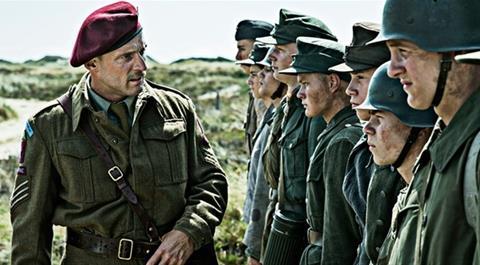Danish landmine drama continues winning streak with $118,000 award; doc winner is Don Juan and audience prizes go to Welcome To Norway! and The Second Mother.

Danish director Martin Zandvliet’s Land Of Mine continued its hot streak by winning one of the world’s most lucrative film festival prizes, Goteborg’s Dragon Award for Best Nordic Film.
The prize comes with $118,000 (SEK 1m), financed by Volvo Car Group, Region Västra Götaland and the City Council of Gothenburg.
Zandvliet and producer Mikael Rieks, who had a day earlier won Rotterdam’s audience award, were on hand to collect the honour on Saturday night in Goteborg.
Zandvliet said the prize was “the one you really want to win” and said such an award enabled “creative freedom.”
Rieks commented that the attention for the film also helped audiences learn about the subject matter, based on the true story of German teenagers forced to clear landmines in Denmark after World War II.
“The subject matter of this movie is very important. It’s getting people to discuss how we treat each other.” He added that 10,000 people are still killed by landmines every year.
The jury, headed by Laurie Anderson, said in its motivation statement that Land Of Mine “shows the tragic cycles of war, when the winners adopt the brutal techniques of the losers. A very intense, suspenseful and beautiful film, which depicts the exploitation of children swept into war and that uncovers new facts about postwar Denmark.”
The Dragon Award for best documentary - and its $12,000 (SEK 100,000) prize — went to Jerzy Sladkowski for his film Don Juan, about a 22-year-old slacker living with his mother in Russia. The jury said: “The award goes to a captivating story with an unforgettable main character. It is sharp and confident. Modern and at the same time grounded in a classical documentary tradition.”
Sladkowski stated: “I am really moved. I had a great meeting with the audience here in Goteborg, it was an unforgettable experience.”
A documentary honorary mention went to the “brave artistic choices” in Maria Back’s I Remember When I Die.
The Ingmar Bergman award for best international debut went to Lost And Beautiful by Italy’s Pietro Marcello, praised for its “stunning elegiac vision, its generosity of spirit, reigniting our faith in humanity during cynical times, and for its meaningful update of cinema.”
The Sven Nykvist Cinematography Award went to Petrus Sjövik for The Model, which the jury said was a film that “radically reverses the roles of model and photographer. Without using the seductive visual language of the French fashion scene, the cinematography persistently presents an everyday life.”
The Lorens Award went to Emma Akesdotter Ronge for producing Goteborg’s opening film (and Berlinale Forum selection) The Yard (Yarden). The jury recognized “a well executed and consistent film with a strong internal drive, the harsh reality is portrayed with a unique artistic expression that blooms into poetry.”
The prize also helps keep film alive, as it comes with 50 rolls of 35mm and processing - donated by Focus Film Lab and Kodak.
The audience awards went to Rune Denstad Langlo’s Welcome To Norway! (best Nordic film) and Anna Muylaert’s The Second Mother (feature film).
Runar Runarsson’s San Sebastian-winning Sparrows from Iceland won the Fipresci award, which was collected by his Swedish DoP Sophia Olsson. The jury said the film was an “honest, unpredictable and beautifully crafted film about adolescents growing up in a small community subject to generational clashes.”
Other winners were Mikael Bundsen (Bonnie scholarship); Land Of Mine (Scandinavian Locations Award); Maximilien Van Aertryck and Axel Danielson’s Ten Meter Tower (best Swedish short,) Joanna Rytel’s Moms On Fire (audience award for best short), Hogir Horiri’s The Girl Who Saved My Life (The Angelo Award); My Skinny Sister (City of Gothenburg Award); Linda Västrik (Mai Zetterling Artist Foundation Stipend); and Lisa Holmqvist (Doris Film prize).
Honorary Dragon Awards were presented to Susanne Bier and Tom Hooper. Hooper, who directed Oscar nominee Alicia Vikander in The Danish Girl, made sure to meet Alicia’s mother Maria Fahl Vikander, a longtime Goteborg Film Festival volunteer, when he was in town.
The 39th edition of the Goteborg Film Festival presented 450 films from 84 countries. Artistic director Jonas Holmberg said presenting such diverse works was “of great importance.” He noted the struggles of political pressures at festivals in Istanbul and Busan, for instance.
“These actions from official bodies are totally unacceptable,” Holmberg said. “I’d like to express our support with our film festival friends. We need to keep fighting for freedom of expression everywhere…These things are not to be taken for granted.”
The awards gala, hosted at the ornate Stora Teatern, was livelier than most, hosted by actor/comedian/drag performer Robert Fux with music from Orchestra Jazz Club 11 Big Band. Another musical highlight of the event was when Les Arcs/Tribeca artistic director Frederic Boyer was invited to explain the annual DJ competition at the Nordic Films party in Cannes, getting the Goteborg crowd on their feet to dance to Lionel Richie’s All Night Long.





















No comments yet